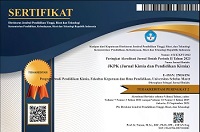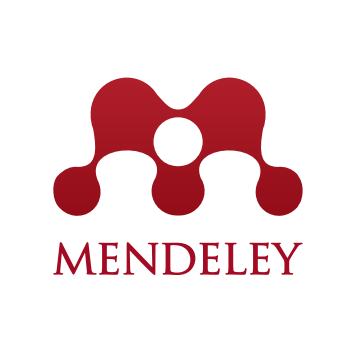Development of Organic Chemistry I Learning Module Integrated Experiment Based on Conceptual Change Model ED3U (Explore, Diagnose, Design, Discuss, Use)
Abstract
Organic Chemistry lecture requires the student to be able to think critically in getting knowledge and prove the facts through experiment. The problem of this lesson is the students have different ability to receive the concepts. To overcome this matter a teaching material, like a module which can facilitate the students who cannot follow lecture well is needed. Therefore, a module which is based on the conceptual change model ED3U (Explore, Diagnose, Design, Discuss, Use) was developed with the steps that activate critical thinking and skilled which appropriate for the learning outcome in alcohol lesson. The module was validated, tested for its practicality and affectivity to ensure the quality and functionality of the module to help students gained conceptual change. The instrument used for validity and practicality test was questionnaire, while test was used for evaluating its effectiveness. The Data was analysed using Cohen Momen Kappa Formula. The result showed that the module developed was valid, practical and effective and fit the category very high with the positive result for conceptual change.
Keywords
Full Text:
PDFReferences
Direktorat Pembelajaran dan Kemahasiswaan, Panduan Penyusunan Capaian Pembelajaran Lulusan Program Studi, Direktorat Jenderal Pendidikan Tinggi Kementerian Pendidikan dan Kebudayaan, 2014.
Depdiknas, Panduan Pengembangan Bahan Ajar, Direktorat Jenderal Manajemen Pendidikan Dasar dan Menengah, Direktorat Pembinaan Sekolah Menengah Atas: Jakarta, 2008.
Shope, E. Richard & William F. McComas, “Modeling Scientific Inquiry to Guide Students in Practices of Science : The ED3U Teaching Model of Conceptual Change in Action”, Inquiry Based Learning for Science, Technology, Engineering and Math (STEM) Program, A Conceptual and Practical Resource for Educators Innovation Volume 4: 217-240, 2015.
Park, Eun Jung and Friends, Understanding Learning Progression in Student Conceptualization of Atomic Structure by Variation Theory for Learning, Lowa City: Paper Presented at the Learning Progression in Science (LeaPS) conference, 2009.
Kutluay, Yasin, Diagnosis Of Eleventh Grade Students’s Misconceptions About Geometric Optic By A Three-Tier Test, Thesis. Turki : The Graduate School Of Natural and Applied Sciences of Middle East Technical Universit, 2005.
Sunyono, “Supporting Students in Learning with Multiple Representation to Improve Student Mental Models on Atomic Structure Concept”, Science Education International, Vol. 26, No. 2, pp. 104-125, 2015.
Sugiyono, Metode Penelitian Bisnis: Pendekatan Kuantitatif, Kualitatif, dan R&D, Alfabeta: Bandung, 2009.
Trianto, Mendesain Model Pembelajaran Inovatif Progresif, Kencana: Jakarta, 2010.
Dj. Latisma, Evaluasi Pendidikan, UNP Press: Padang, 2010.
Boslaugh. Sarah & Paul A. W., Statistics in a Nutshell, a desktop, quick reference, O’reilly: Beijing, Cambridge, Famham, Köln, Sebastopol, Taipei, Tokyo, 2008.
Refbacks
- There are currently no refbacks.








